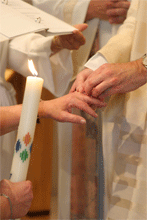[[Dear Sister, I have wondered for some time what makes a person want to be a hermit. It just never made sense to me unless the person was broken and embittered by life and needed to withdraw from that by giving up on people and even on God. It's the solitude that I can't justify. Community made sense but not solitude unless hermits were people who were unable to participate in community for some reason. When you have written about the creation of the hermit heart in your own life it sounds like it involved a lot of suffering but you don't come across as bitter or broken. Thomas Merton has written about this very thing (please see what I quoted from "The Hermitary" site); have you seen this already? But I wondered what makes your heart a hermit heart and not the heart of an embittered survivor of suffering. Is the answer in what Merton wrote about mercy?
Do you think Merton is correct in characterizing the "ideal solitary" as he does? If this is true it must be really difficult for dioceses to "discern" this kind of vocation. Do you know what I mean? In religious life candidates are screened for their health and wholeness and backgrounds involving suffering raises red flags for the vocation personnel. But if ideal hermits are "tormented solitaries" what does a diocese look for in determining authentic eremitical vocations?]]
 Thank you for your observations and questions. I have written recently again, though briefly, about fraudulent hermits; what you are asking about is really one of the more significant ways people betray the eremitical vocation or substitute an inauthentic version of the life for the real thing. What Merton was saying first of all, as I read him, is that solitude must open the door to the one wishing to live an eremitical life; one cannot simply decide to live solitude and do it without such an opening. The second thing I believe Merton is writing about is how the door of solitude is often opened to a person. One of the main ways is through suffering that isolates in any of the many ways this occurs. But I agree with you that suffering is not sufficient to truly discern an eremitical call; it is a beginning and might be suggestive but it is not definitive.
Thank you for your observations and questions. I have written recently again, though briefly, about fraudulent hermits; what you are asking about is really one of the more significant ways people betray the eremitical vocation or substitute an inauthentic version of the life for the real thing. What Merton was saying first of all, as I read him, is that solitude must open the door to the one wishing to live an eremitical life; one cannot simply decide to live solitude and do it without such an opening. The second thing I believe Merton is writing about is how the door of solitude is often opened to a person. One of the main ways is through suffering that isolates in any of the many ways this occurs. But I agree with you that suffering is not sufficient to truly discern an eremitical call; it is a beginning and might be suggestive but it is not definitive.On Unredeemed Suffering and the Door to Solitude:
Moreover, if a person has nothing but her suffering and if that suffering remains unredeemed or un-transfigured by the grace and love of God, she will never be a hermit in the proper (Christian) sense; instead she will remain an isolated, broken, and possibly embittered person but one who is largely, if not entirely incapable of proclaiming the Gospel with her life. Such a person ought not be admitted to profession as a canonical hermit because while she may "not have a place" --- one element of Merton's description --- neither can she live out the mission or charism of the canonical hermit. Genuine solitude is redeemed and transformed isolation. It is marked or characterized by its relational tenor, a unique but very significant and paradoxical form of relatedness, of ecclesiality and community. The place the hermit has is unusual but very real. The door solitude opens to us is unlocked in part by significant and long-term suffering a person experiences through the first half of her life, but at the same time the door of Solitude can only said to be opened if the person has come to know the potential healing and transformation of her woundedness by the unqualified love and eternal life of God.
 While persons whose first half of life may be marked by significant suffering are sometimes important and illustrative of the way some eremitical vocations are born, as you say they are sometimes also difficult cases in regard to discernment by dioceses. This is especially true if suffering remains the defining dimension of the person's life. When I began this blog more than a decade ago I wrote about one needing to be a hermit in some essential sense before one approached a diocese with a request to be professed. What I meant then and still hold is that one has to move from being an isolated person for whom physical solitude may merely mirror or even exacerbate the alienation that can come from and be a source of suffering to being one for whom solitude is a relational reality which heals isolation and is the context for real reconciliation. Hermits know more than physical solitude; they know communion -- with God and others. And this means they can (and in fact must) know the healing of whatever suffering marked their earlier years. When dioceses work with potential candidates for profession they must look for those persons for whom physical solitude is a unique form of communion and symptom and source of healing.
While persons whose first half of life may be marked by significant suffering are sometimes important and illustrative of the way some eremitical vocations are born, as you say they are sometimes also difficult cases in regard to discernment by dioceses. This is especially true if suffering remains the defining dimension of the person's life. When I began this blog more than a decade ago I wrote about one needing to be a hermit in some essential sense before one approached a diocese with a request to be professed. What I meant then and still hold is that one has to move from being an isolated person for whom physical solitude may merely mirror or even exacerbate the alienation that can come from and be a source of suffering to being one for whom solitude is a relational reality which heals isolation and is the context for real reconciliation. Hermits know more than physical solitude; they know communion -- with God and others. And this means they can (and in fact must) know the healing of whatever suffering marked their earlier years. When dioceses work with potential candidates for profession they must look for those persons for whom physical solitude is a unique form of communion and symptom and source of healing.My Own Healing and Growth Work:
In my own inner work I have become even more convinced of this truth. Both of the quotations you cited are important but in regard to becoming the hermit I am called and consecrated to be I especially resonate with the first one. [[The contemplation of the Christian solitary is the awareness of the Divine mercy transforming and elevating [her] own emptiness and turning it into the presence of perfect love, perfect fullness.]] This is the one which mirrors my profession motto, [[(God's) power is made perfect in weakness]] --- a motto I chose precisely because it reflects first the nature of the Christ Event and then my own story with and in light of the grace of God. My own story involves suffering, yes, but far more than that it is the story of God's grace, a grace which, as I have said here many times, brings light out of darkness, life out of death, and meaning out of senselessness and absurdity. What Merton says, what Paul says, what the Christ Event makes real in space and time, and what authentic hermits of all sorts also say is that suffering plunges a person into the depths of isolation and readies her to hear God's invitation to depend on God alone. When, and to the extent that invitation is accepted one's life is entirely transfigured into one of wholeness and holiness, one is defined in a new way. Suffering may not ease entirely and may even increase in some ways, but it will no longer be the thing which drives and defines the person.
 And this means, of course, that one whose defining experience is the mercy of God will show this to those discerning her vocation. The one who wishes to become a diocesan hermit will reveal the mercy of God as the ground and source of her suffering's redemption and her life's transfiguration. Without this her solitude will be nothing more than physical and maybe spiritual, and emotional isolation. She will be a lone individual --- her suffering will have made her this on a number of levels, but she will not be a hermit in the sense the Church uses the term. On the other hand those individuals who have made the journey that Merton describes, the journey through serious suffering and into the mercy and love of God, may well have discovered the eremitical world solitude herself (and only "Solitude" herself) admits them to.
And this means, of course, that one whose defining experience is the mercy of God will show this to those discerning her vocation. The one who wishes to become a diocesan hermit will reveal the mercy of God as the ground and source of her suffering's redemption and her life's transfiguration. Without this her solitude will be nothing more than physical and maybe spiritual, and emotional isolation. She will be a lone individual --- her suffering will have made her this on a number of levels, but she will not be a hermit in the sense the Church uses the term. On the other hand those individuals who have made the journey that Merton describes, the journey through serious suffering and into the mercy and love of God, may well have discovered the eremitical world solitude herself (and only "Solitude" herself) admits them to.Summary: A Note to Dioceses on the Charism of Diocesan Eremitical Life
To reiterate then, Dioceses which are careful in their discernment will not eschew a person whose life is full of suffering so long as that life is also one defined and clearly transformed by the grace of God experienced in eremitical solitude. Such a diocese is careful to look not only at the suffering but at the fruits of that suffering which would demonstrate it has been transfigured by the mercy of God. When the latter is not clearly present, when for instance, the person's message is self-centered and full of expressed pain but little else, when, that is, her life is defined by her suffering and not by the grace of God, the diocese will have to wait and watch to see what kind of vocation is actually present. They will give the person some reasonable time in physical solitude to see what changes occur. Generally speaking, if the person is called to be a hermit, isolation and a focus on suffering will be transformed by the love of God into genuine solitude (a unique but very real expression of reconciliation and community in Christ) and the proclamation with her entire life of the healing and redemptive love of God.
 Also generally speaking, all of this reflects the way the heart of a hermit is created and the door to eremitical solitude is opened when there is a background or history of significant suffering. It reflects the way a life comes to reveal the charisma or gift to Church and World c 603 calls "the Silence of Solitude" in such cases. Suffering of all sorts can hollow one out and make one yearn for answers to the question of self that only God can provide. One lives the questions associated with meaning: does my life make sense? Is it meaningful? Is it moved by love, both as giver and receiver? How can I make sure my life is meaningful by ministering to others in a way which is redemptive for them? Why have or am I suffering in the apparently gratuitous way I have or am? Where is God in all of this and how can I live for God and others? As important as living the questions is, through the grace of God mediated to one in all the ways it comes to us, one will also come to live the answer: namely, I have lived/am living all of this so that the Gospel of God in Jesus Christ is proclaimed loudly and clearly (or silently but with clarity and poignancy!) and the God whose power is perfectly revealed in weakness resonates within my heart causing it to sing a Magnificat of gratitude and praise.
Also generally speaking, all of this reflects the way the heart of a hermit is created and the door to eremitical solitude is opened when there is a background or history of significant suffering. It reflects the way a life comes to reveal the charisma or gift to Church and World c 603 calls "the Silence of Solitude" in such cases. Suffering of all sorts can hollow one out and make one yearn for answers to the question of self that only God can provide. One lives the questions associated with meaning: does my life make sense? Is it meaningful? Is it moved by love, both as giver and receiver? How can I make sure my life is meaningful by ministering to others in a way which is redemptive for them? Why have or am I suffering in the apparently gratuitous way I have or am? Where is God in all of this and how can I live for God and others? As important as living the questions is, through the grace of God mediated to one in all the ways it comes to us, one will also come to live the answer: namely, I have lived/am living all of this so that the Gospel of God in Jesus Christ is proclaimed loudly and clearly (or silently but with clarity and poignancy!) and the God whose power is perfectly revealed in weakness resonates within my heart causing it to sing a Magnificat of gratitude and praise.





















































